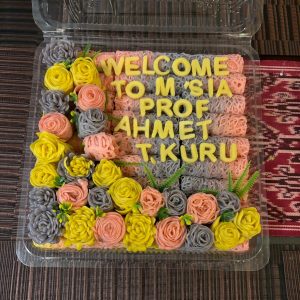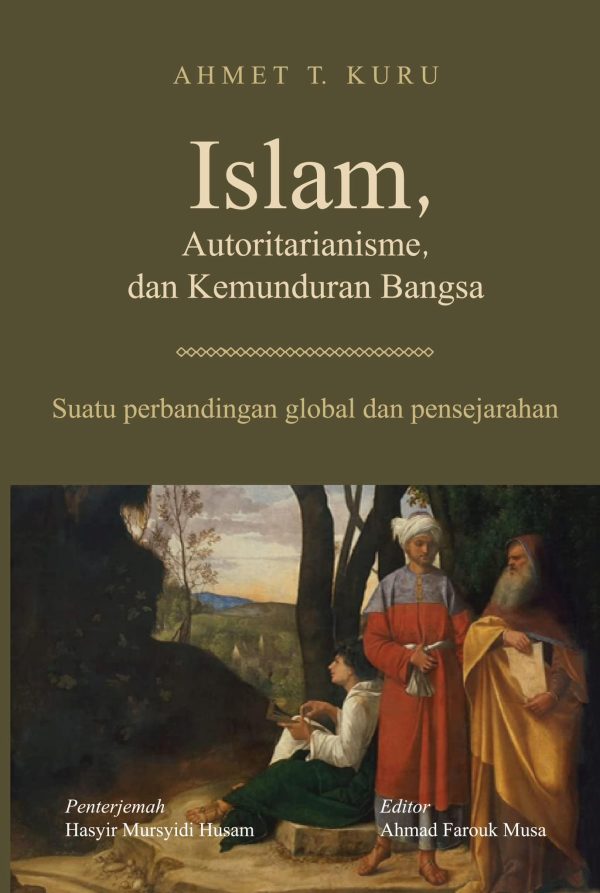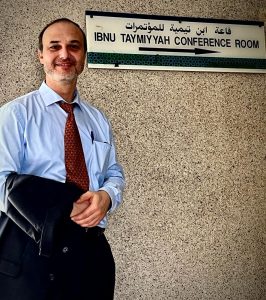15 January 2024
Ahmet T. Kuru (PhD, University of Washington) is the director of the Center for Islamic and Arabic Studies and a Professor of Political Science at San Diego State University. He was a postdoctoral scholar at Columbia University. This interview was conducted by Ahmad Muziru Idham, Research Fellow at Islamic Renaissance Front on Saturday morning, 6th January 2024. That is just one day after the Professor’s arrival in Kuala Lumpur before the series of unpleasant events that culminated in his near-arrest at KLIA (Kuala Lumpur International Airport).
 Muziru: Thank you Prof Ahmet for granting me this interview. I believe this is your first visit to Malaysia. Can you tell us your first impression of this country upon touching down?
Muziru: Thank you Prof Ahmet for granting me this interview. I believe this is your first visit to Malaysia. Can you tell us your first impression of this country upon touching down?
Kuru: I am thankful to Islamic Renaissance Front, especially its director Dr. Farouk Musa for inviting me to Malaysia and for translating my book with the Malay title “Islam, Autoritarianisme, Dan Kemunduran Bangsa: Suatu Perbandingan Global dan Pensejarahan.” I am very grateful for the warm hospitality I have received from my Malaysian friends. I am happy to finally visit Malaysia, one of the most important Muslim-majority countries. Putrajaya strikes me as a beautiful and well-planned capital city. I visited the “steel mosque” during the Juma’ah prayers and then the Putra Mosque, which is gorgeous.
When my book launch was announced, there were certain conservative criticisms on Facebook, mostly based on misunderstandings. Some people thought that I am coming to Malaysia to impose what they called liberalism. I am a practicing Muslim. I have no agenda about this so-called liberalism. I wrote the book from a social scientific perspective. The only point I emphasize is that multiple interpretations of Islam—Hanafi, Shafi’i, Hanbali, Maliki, or others—should co-exist peacefully. Of course, I’ve studied Islamic thought in depth; I am the Director of the Center for Islamic Arabic Studies at my university.
Despite the criticisms on Facebook, I came to Malaysia with a very positive energy. I hope my talks and conversations will clarify the misunderstandings. I’m looking forward to fruitful conversations with Malaysian scholars and readers.
Muziru: Can you tell us a little bit about yourself and the reason that motivated you to write this book?
Kuru: I grew up in Türkiye where there was a constant debate between secularists and Islamists about what happened to the Ottoman Empire and what will be the future of Türkiye in particular and the Muslim world in general. In fact, the very beginning of my book “Islam, Authoritarianism, and Underdevelopment” started with a debate between my late father (Allah yarhamu) and a secularist general. The secularist general said Muslims were just consumers; they didn’t contribute to civilization. My father defended Muslims’ historical contributions to philosophy and the sciences.
The secularism debate also appeared in my first book, “Secularism and State Policies toward Religion: The United States, France, and Turkey.” That book criticized secularism in Türkiye and France, particularly their banning of Muslim women’s headscarves. It was not only a scientific analysis for me, but also a personal issue because my wife also wears a headscarf, and she—like many other Muslim women—faced discrimination because of the secularist ban. So, for many years, I was criticized by assertive secularists for being a practicing Muslim personally and for writing a book to criticize assertive secularism. It is surprising to see how some Malaysians on Facebook define me as an anti-religion secularist. This has happened for the first time in my life.
In reality, every individual is complex. Labeling someone as Islamist, secularist, or liberal is too simplistic. We should look at an author, and every individual for that matter, as a sophisticated being created by Allah. In this regard, I’m requesting the critics to read my book properly before judging it. I spent ten years writing it, and it references about 1,000 articles and books in the bibliography.
How can they judge a book by using only one sentence referring to anti-intellectualism? The book refuted Islamophobic theses, especially those of Samuel Huntington and Bernard Lewis. How is it possible that some Muslims read the book and say it is anti-Islam? I think they either didn’t read the book or did not understand it correctly.

Muziru: Can you now tell us the gist of this book and the link between authoritarianism and underdevelopment?
Kuru: The main thesis of the book is that Islam was the main framework of the Muslim golden age, which happened between the 8th and 12th centuries when Muslims produced world-leading mathematicians, philosophers, and scholars in many other fields. Then the book is asking why today Muslims no longer produce world-renowned scholars, even in the field of Islamic studies. It’s very rare to see an influential scholar of the caliber of Abu Hanifa, Imam Ghazali, Ibn Taymiyya, Taftazani, Jurjani, etc. Why are we no longer producing such influential scholars?
To answer to this question, the book argues that autonomy is very important; autonomy of religious scholars and economic entrepreneurs from the government. If there is a certain level of separation between political authority, religious scholarship, academia, and economic entrepreneurship, then this will provide justice, competition, and productivity. By contrast, when you merge these fields and make some of them dominant over the others, the result is corruption, injustice, and inefficiency.
I am not only criticizing the clergy-state alliance but also criticizing the capitalist domination of society. In America today, we have this problem: the economic class is trying to dominate other fields. Universities and other institutions try to resist such domination. That’s the fight we are doing to maintain autonomy. As another example, during the Soviet era, Marxist ideologues were the allies of the state. It was a problem.
And today the clergy-state alliance is not only happening in the Muslim world but also in Russia, the Orthodox church allied with Putin; in the US, the Evangelicals allied with Trump; in Israel, the Orthodox Jewish parties allied with Netanyahu; and in India, Hindu religio-nationalists allied with Modi. Therefore, we are discussing a global problem.
Muziru: Your book is very critical of the intellectual stagnation in the Muslim world today. Do you agree with the assertion that “there is no more science in the Muslim world after al-Ghazali”, hence he caused this intellectual stagnation?
Kuru: No, I disagree with this assertion. And thanks for asking this question because this is one of the main misunderstandings about my book. Some critics think that I simply reproduce the idea that al-Ghazali killed philosophy in the Muslim world. This is a wrong idea because one man—even if he is as important as al-Ghazali—cannot stop an entire civilization. Al-Ghazali was a very complex thinker. I read two dozens of his books and cited many of them in my book with hundreds of references to them. Some are critical. That is normal.
How can we not criticize someone who lived 1000 years ago and who was not a prophet? Al-Ghazali left a very influential legacy in the Muslim world. It’s normal to have a critical approach toward his legacy; otherwise, what we are producing today would not contain anything original. Originality requires a critical attitude toward historical thinkers. Let me repeat: al-Ghazali and other historical figures are not prophets; they are perfect but fallible human beings despite their wonderful achievements.
But at the same time, we cannot simply blame one scholar for the huge problems of the Muslim world spread over four different continents. That’s why I argue in my book that the ulama-state alliance, which means the combination of religious and political authorities with a certain ideology and power, has been the main source of the problems.
Let me conclude by saying that even al-Ghazali himself acknowledged that the close relations between the ulema and the rulers were a problem. Therefore, when he decided to become a Sufi—at the age of around 40—he went to Prophet Ibrahim’s (alayhi al-salam) graveyard and took an oath on three things: that he would never receive money from rulers, never join the rulers’ discussion gatherings again, and never teach in madrasas under the rulers’ control again. That’s why in the last ten years of his life, he taught in a private Sufi lodge (khanaqah) and a private madrasa in his hometown. Hence, even al-Ghazali recognized the ulama-state alliance as a problem.
Muziru: This Ulama-State alliance is entrenched in many Muslim states. Do you think that there is going to be a reversal in the situation in the future?
Kuru: This current situation is not sustainable. It’s not simply me who’s saying that, but many people. Even MBS (Mohammed bin Salman Al Saud), the Crown Prince of Saudi Arabia, has acknowledged the problem. Because neither the ulama nor the state is an economically productive class. They always need external funding. Historically, from the 11th century to modern times, they generally used agricultural revenues. But in the last 50 years, the main funding of the ulama-state alliance in Saudi Arabia, Iran, and many other countries came from oil money. That’s what we call rentier economies. But now the oil era is coming to an end, either by the depletion of oil as we see in Indonesia now (it has become an oil importer), or by new technologies like electrical cars and green energy. The result will be declining oil revenue. Thus, there will be an economic crisis in oil-dependent countries. That’s why the UAE and Saudi Arabia are trying to diversify their economies. As a result, leaders like MBS are trying to sideline the ulama. If Saudi Arabia is having such a transformation, other countries like Malaysia cannot be immune to change.

Muziru: What is your suggestion for Muslims to regain the intellectual prominence they had during the time of the House of Wisdom? Do you think the theology of Ash’arism played a role in the devolution of intellectualism?
Kuru: My brief answer to the first part of your question would be that we should start tolerating diversity of views. This is what is required for innovation, creativity, and scientific productivity.
My answer to the second part of your question is: no! I don’t simply see Ash’arism as a problem. Ash’arism and other interpretations of Islam are welcome as long as they tolerate other interpretations. For example, I disagree with Ahmed Ibn Hanbal’s idea that there are almost no metaphors in the Qur’an and Hadith. But at the same time, I appreciate how Ahmad bin Hanbal refused to obey political authority during the rationalists’ inquisition under the rule of Abbasid caliph Ma’mun.
But, if Asha’rism or Mu’tazilism—an irrational or a rational interpretation of Islam—becomes hegemonic, this would be the problem. We should not let one view dominate the entire Islamic public life.
Muziru: You were being accused of being anti-ulama in Malaysia. What do you have to say about this allegation?
Kuru: In the narrow sense of the term, I like and respect the ulama. In the broad sense of the term, meaning scholars in general, I may consider myself a part of the ulama. My book emphasizes how the pre-11th century ulama, such as Abu Hanifa, Imam Malik, Imam Shafi’i, and Ahmad ibn Hanbal, stood up against authoritarian politics even though they were imprisoned or beaten by political authorities. My critique of the contemporary ulama is about their politics. I’m asking them to stand up against political corruption and criticize rulers who commit crimes. If the ulama are embedded too much in politics, how can they represent morality?
Muziru: This might be a bit sensitive Prof, but you have been accused of being a Gulenist from your call not to vote for AKP in the previous election. What is your comment on this?
Kuru: In Türkiye, it is difficult to see a religiously practicing person without any history of engagement with the Gulenists in the late 1990s and the early 2000s. Erdogan himself was deeply engaged with Gulenists at that time; then he publicly apologized for this engagement. I considered Erdogan’s AKP as a politically progressive, democratic actor who would make Türkiye a member of the EU, and the Gulen movement as a promoter of education, that opened hundreds of schools all around the world. During the last decade, however, I wrote essays critical of the AKP and very critical of the Gulenists in Turkish. I also write some essays in English such as the well-read article “Islam and Democracy in Turkey: Analyzing the Failure.”
Many Gulenists have accused my essays of blaming the victim. They said if Ahmet Kuru lived during the time of the Holocaust, he would criticize the Jews because he now criticizes the Gulenists when they are persecuted by the Erdogan government. The AKP government, on the other hand, labels any influential critics either as Gulenist or Kurdist. If I write essays supporting Erdogan, the Turkish government will roll out the red carpet for me.
On your specific question of not voting for AKP; 48 percent of the people in Türkiye consistently say no to Erdogan in elections. Can the government categorize this 48 percent as terrorists?
 Muziru: What is your opinion on the similarities between Malaysia and Türkiye in terms of the ulama-state alliance?
Muziru: What is your opinion on the similarities between Malaysia and Türkiye in terms of the ulama-state alliance?
Kuru: I came here to learn about Malaysia. I know Indonesia relatively more. Since the publication of the Indonesian version of my book three years ago, I have had a deep engagement with Indonesian scholars and readers. About 50 reviews of my book have been published in newspapers, magazines, and video channels in Indonesia. I hope that after IRF publishes the Malay version of my book, I will have a deeper engagement with Malay media and academia.
Regarding Türkiye, we have the institution called Diyanet (Directorate of Religious Affairs) which was established by Mustafa Kemal Ataturk, Türkiye’s founding president. The main reason why Ataturk and his followers—we call them Kemalists—founded and kept Diyanet is that they wanted religion to be centrally controlled. They think Islam can be dangerous if there is no state control over it. The Diyanet has been paying the salaries of imams in over 80,000 mosques. Everything has pros and cons. The good aspect of the Diyanet is that it provides the maintenance and cleanliness of mosques. The negative side is that it does not allow imams to prepare Friday sermons freely. Diyanet has centralized texts of sermons that Imams are supposed to recite to their audience. Diyanet is also an example of how religious authority is too much embedded in politics. Certain critics of Erdogan have stopped going to juma’ah prayers, saying that the Diyanet mosques represent the government.
Let me conclude with an example from the United States since I study religion and politics comparatively. In the US, many Democrats have stopped going to churches by seeing them as partners of the Republican Party. So, the politicization of religion weakens religious participation.
Muziru: Finally, what do you hope to see in the future of the Islamic World, especially in Türkiye and Malaysia?
Kuru: Let me tell you two points about the future of the Muslim world. First, the Israeli bombing of Gaza killed more than 23,000 Palestinians. What are the diplomatic and economic responses of the Muslim world to stop this massacre? Almost nothing because the Muslim world is weak and disorganized. I imagine a Muslim world to be more democratic and more developed in the future. With democracy and development, Muslim societies will be powerful enough to prevent massacres and genocides as we see today in Gaza. Second, the future of the Muslim world is crucial for the future of our planet. A quarter of all countries in the world are Muslim-majority. Muslims constitute over 20 percent of the world’s population; around 1.8 billion people are Muslims. If the Muslim world finds a way of establishing open societies, productive academic institutions, and innovative economic corporations, that will be crucial for the future of the world. In the future, I hope to see more tolerance of diversity, emphasis on creativity, and encouragement of innovation in the Muslim world. I hope my book will contribute to such a vision with its English, Arabic, Persian, Indonesian, Malay, and other editions.
Muziru: Well, that was the last question for our interview session. Thank you, Professor, for this enlightening interview session.
Kuru: Thank you.

